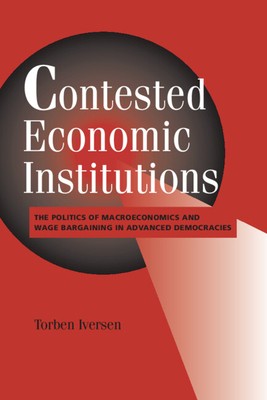
- We will send in 10–14 business days.
- Author: Torben Iversen
- Publisher: Cambridge University Press
- ISBN-10: 0521642264
- ISBN-13: 9780521642262
- Format: 15.8 x 23.1 x 2.3 cm, kieti viršeliai
- Language: English
- SAVE -10% with code: EXTRA
Reviews
Description
This book helps explain one of the most intriguing and politically salient puzzles in comparative political economy: why some countries have much higher unemployment rates than others. Contrary to new classical economics the focus is on explaining distribution and equilibrium unemployment, and contrary to neo-corporatist theory the role of monetary policy and rational expectation is integral to the analysis. The book makes two central arguments. The first is that monetary policies affect equilibrium employment whenever wages are set above the firm level. The second argument focuses on the distributive effects of different institutions, and models institutional design as a strategic game between partisan governments and cross-class alliances of unions and employers.
EXTRA 10 % discount with code: EXTRA
The promotion ends in 22d.16:18:00
The discount code is valid when purchasing from 10 €. Discounts do not stack.
- Author: Torben Iversen
- Publisher: Cambridge University Press
- ISBN-10: 0521642264
- ISBN-13: 9780521642262
- Format: 15.8 x 23.1 x 2.3 cm, kieti viršeliai
- Language: English English
This book helps explain one of the most intriguing and politically salient puzzles in comparative political economy: why some countries have much higher unemployment rates than others. Contrary to new classical economics the focus is on explaining distribution and equilibrium unemployment, and contrary to neo-corporatist theory the role of monetary policy and rational expectation is integral to the analysis. The book makes two central arguments. The first is that monetary policies affect equilibrium employment whenever wages are set above the firm level. The second argument focuses on the distributive effects of different institutions, and models institutional design as a strategic game between partisan governments and cross-class alliances of unions and employers.


Reviews